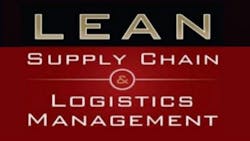Commitment and Training are Essential for a Lean Supply Chain
While conceptually both supply chain management and lean manufacturing date back at least to the 1950s, and emerged as practical business strategies in the 1980s, it's only been in recent years that the idea of a lean supply chain has taken root.
One reason for that is that manufacturers preferred to "lean out within their four walls before working heavily with customers and suppliers," notes Paul Myerson, managing partner of consulting firm Logistics Planning Associates and author of "Lean Supply Chain and Logistics Management" (McGraw-Hill, 2012).
Another reason is that the recession has spurred companies to focus harder on eliminating waste from their supply chains, a key component of lean supply chain management.
Myerson refers to the supply chain using the classic SCOR model of "plan, source, make, deliver and return." These core processes, he says, are where companies should begin to look for lean opportunities in their supply chain, where they can then start to think about eliminating nonvalue-added activities, or waste, from each of these processes.
"Prominent areas that are ripe with waste are purchasing, warehouse operations, demand forecasting, international logistics and planning and scheduling," Myerson says. "There are an almost unlimited amount of opportunities beyond those areas when you truly understand the lean philosophy and start to really think about it."
Computer giant Dell Inc. is typically cited as being among the best in lean supply chain management, Myerson says, because they do a lot of things right. "They work closely with their suppliers to operate in a just-in-time mode. They configure, assemble and test computers in 24 hours and turn their inventory over 90 times per year. Dell is a great example of a mass customization or a total 'pull' type of process."
By forging very tight relationships with its key vendors, Dell is able to virtually integrate its suppliers to the point that they function almost as an extension of Dell itself. The company relies on third-party logistics providers to deliver parts on a JIT basis, basically outsourcing its inventory management entirely.
Leaning Out the Warehouse
How does a company get started on a lean transformation of its supply chain? According to Myerson, "The first thing they need to do is decide that they are going to commit to the cultural change that will need to occur in order to be successful." That doesn't mean reproducing the ?Toyota Production System, he says, but rather understanding the lean philosophy and putting forth the commitment in training and other resources to make it work.
It is important that manufacturers begin the training process to gain the commitment of employees and to create a structure for success, which includes the incorporation of lean coordinators, lean champions, kaizens and other continuous-improvement events. "After that, I recommend performing lean supply chain opportunity assessments," Myerson says, "which gives management a good idea of where the best places to start might be."
The attrition rate for failed lean transformations is quite high, Myerson admits, as much as 50% to 70%. The main reason for these failures, he believes, is lack of commitment from the executive team. He says it is vital not to treat lean as a fad and to include lean in the evaluation of suppliers and partners.
In particular, lean can be a challenge in the warehouse environment where the emphasis is traditionally on productivity (cases/hour), facilitated by temporary labor during peak times. "That being the case," he says, "management has to make it a point to carve out the time for training and kaizen events and create a visual workplace with standardized instructions that everyone can easily understand."
About the Author
Dave Blanchard
Senior Director of Content
Focus: Supply Chain
Call: (941) 208-4370
Follow on Twitter @SupplyChainDave
During his career Dave Blanchard has led the editorial management of many of Endeavor Business Media's best-known brands, including IndustryWeek, EHS Today, Material Handling & Logistics, Logistics Today, Supply Chain Technology News, and Business Finance. He also serves as senior content director of the annual Safety Leadership Conference. With over 30 years of B2B media experience, Dave literally wrote the book on supply chain management, Supply Chain Management Best Practices (John Wiley & Sons, 2010), which has been translated into several languages and is currently in its second edition. He is a frequent speaker and moderator at major trade shows and conferences, and has won numerous awards for writing and editing. He is a voting member of the jury of the Logistics Hall of Fame, and is a graduate of Northern Illinois University.
